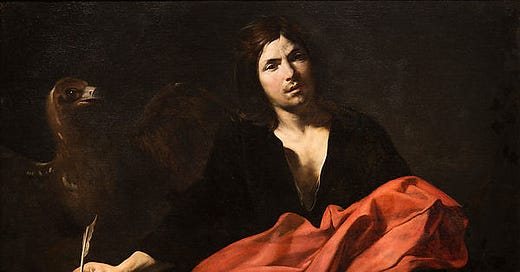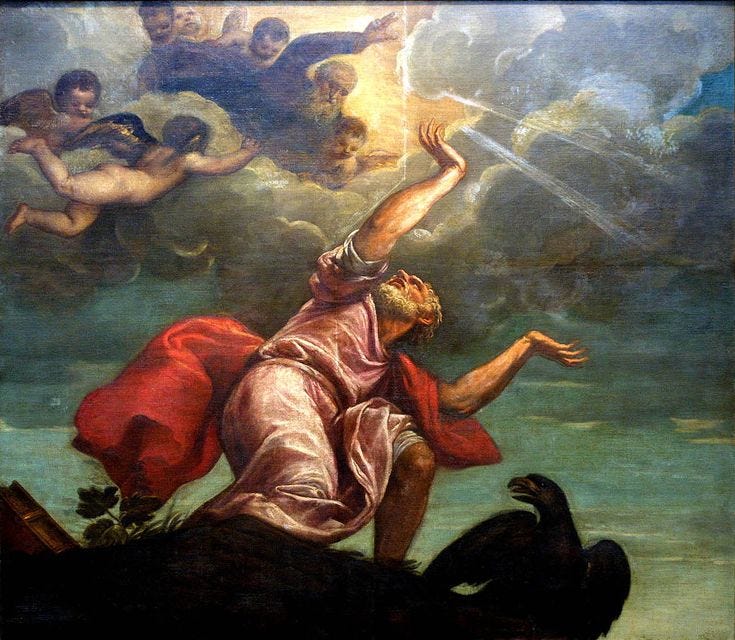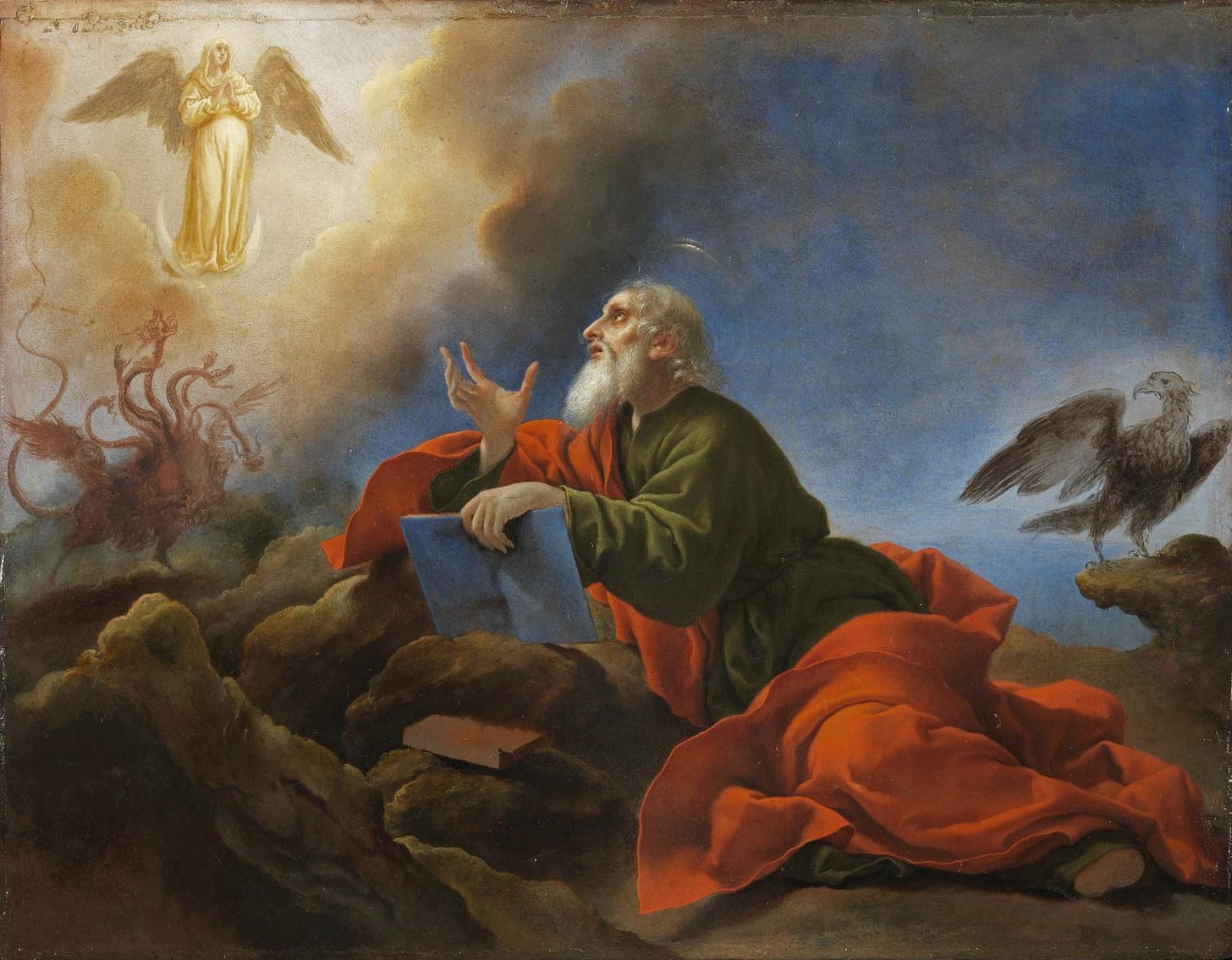On this the Tenth Day of Christmas and Octave of St John the Apostle1, we ask you to join us in this Novena to our Patron Saint, St John the Apostle. This Novena will conclude on the final day of the Octave of St John the Apostle.
My most loving Saint, St. John the Apostle, behold me kneeling at thy feet, beseeching thee with all the affection of my heart to grant me thy special protection, particularly when in danger of offending God. O my dear and holy advocate, remember me before the throne of the most holy Trinity, and obtain for me from the infinite goodness of God, the virtues of humility, purity, obedience, and the grace to fulfill exactly the duties of my state.
Our Father, Hail Mary, Glory
II. O my dear Saint, St. John the Apostle, I renew to the Lord, through thee, the holy resolutions which I have frequently made of intending to love and serve Him faithfully. I am resolved to detach myself from every earthly thing, and I desire ardently to unite myself to Him, as my first beginning, last end, and sovereign good. My dear Saint, I beseech thee to offer to the most holy Trinity the sacrifice of my whole being, particularly of my judgment and will, in order to conform fully to God most holy, because I desire nothing else besides His grace and His holy love.
Our Father, Hail Mary, Glory
III. My sweet and holy Protector, St. John the Apostle, behold me again full of love for thee and full of confidence, beseeching thee to cast thyself on thy knees before the throne of the most holy Trinity, and entreat most ardently that God, through His infinite goodness, may grant me the grace to fly sin, and the gift of final perseverance. Thou knowest, O my dear St. John the Apostle, how great are the temptations to which man is subject, and how continual are the perils I run of being lost; do thou assist me with thy efficacious prayers.
Our Father, Hail Mary, Glory
St. John, the disciple whom Jesus loved; St. John, the disciple who loved Jesus. In both relations St. John is to us an object of admiration, and, at the same time, our model for imitation. But there is a third trait in his character which shines with peculiar brilliancy: St. John is also the Apostle of brotherly love.
Read his letters, and compare them with those of the other Apostles, and you will be convinced that St. John merited the honorable name: Disciple of love. These epistles are an outpouring of love towards his neighbor, consequent upon his great love of God. They are replete with a longing to call forth and strengthen a similar love in the hearts of all the faithful.
If we inquire still further into the motives which, in the heart of St. John, produced, strengthened and animated this wonderful love, we will perceive that the cause is this: St. John regarded his neighbor in the light of faith. Let us do likewise, and we will feel encouraged to love our neighbor as ourselves, and our lives will prove that we are well disposed towards all.
O Mary, thou Eve of the New Testament, obtain for us that love of our neighbor which inflamed the heart of St. John, that we may mutually edify and sanctify each other! I speak in the holy name of Jesus, to the greater honor of God!
"Thou shalt love thy neighbor as thyself." This is the second commandment, and it is like to the first: "Thou shalt love the Lord thy God, with thy whole heart, with thy whole strength, and with thy whole soul." Verily, these are forcible words, and how few really understand and reflect upon their full signification; and still smaller is the number of those who are governed by these two precepts as was St. John the Evangelist.
This Apostle, who entertained such love for Jesus, fulfilled this great commandment of love of God and of his neighbor in a most perfect manner; because, in the person of Christ, he loved both God and man with unbounded love, and because, as I have said, he regarded every man in the light of faith. Why do we not practice this love of our neighbor in as perfect a manner? I reply: We are deficient in that liveliness of faith and that love for Jesus which animated St. John.
How indifferently a person will treat his neighbor as long as he regards him in a mere natural light! What do we hear more frequently than the remark: What have I to do with that person? We speak thus, because man, simply as a fellow-being, seems to have no particular claim to our sympathy. He is a human being, but still--what is he to me? Oh! a great deal. Regard your neighbor with the eyes of faith, and then how venerable, how attractive, and how worthy of your sympathy will he appear to you! Then you will feel, how St. Chrysostom had reason to exclaim in astonishment: "How, you say: What is that man to me? Why, he is a man, is not this sufficient to rouse your interest in him?"
I will give a practical illustration: You come to a railroad depot. Behold! a poor family just arrived, with a sick infant but a few months old; it is placed on the hard wooden floor! Poor mortal, how wretched, how miserable you are! you will say, if you regard it simply with the eyes of your body. But open the eyes of your spirit to the light of faith, and you will say: O child, in this body covered with disease lives a soul created after the image of the Father, Son, and Holy Ghost! God has thought of you from all eternity, and has given you a being immeasurably more glorious than all the shining worlds of the firmament; yes, more glorious than all that may be beyond this world of stars, with the exception of the angel worlds!
You are a human being. The Son of God has adopted your nature, and has exalted it above all the choirs of angels, and you are soon to share His glory for all eternity. If already baptized, you are in a state of sanctifying grace, which transforms you into a child of God, and makes it possible for you to gain merits for life eternal. A throne is awaiting you in the heavenly kingdom; and how many gems of merit you can secure for your celestial crown, if on earth you accomplish the holy will of God, and for love of Him faithfully discharge the duties of your vocation! When once you are admitted to the communion of saints, you may address all the angels as your associates; all the saints as your brothers and sisters; Mary as your mother; and Jesus, the Son of God, as your brother. Christian, do you perceive what powerful motives urge us to assist every person with active works of charity?
What, in the next place, incites us to assist others to practice works of mercy, is the merit of such works in the sight of God. "Blessed are the merciful; for they shall obtain mercy," Christ says; and, again: "What ye do to the least of mine, ye have done to me." And if this holds good in regard to the corporal works of mercy, how much more so in respect to the spiritual, which benefit the soul, and of which St. Chrysostom justly remarks: "A single work of this kind is worth more in the sight of God than all the corporal works taken together, even if we should provide for all the sick and needy of the whole world."
Thus thought St. John; and if with him, we regard all that we can do for the welfare of our neighbor, in the light of faith, we will strive to make use of every opportunity that presents itself, to perform works of mercy, and we will, moreover, seek opportunities of doing good. But what enhances the merit of these works of charity, is the assurance of Christ, with which you are all familiar: "Whatever ye do to the least of mine, you have done to me."
Man, alas! looks upon his neighbor merely with the eyes of his body; he regards only his social position; and therefore we find so great want of zeal for the performance of charitable deeds. And, furthermore, we are but too apt to forget that, by assisting others, we are doing more for ourselves than for our neighbor.
A fervent soul, like St. John's, that truly loves Jesus, is desirous of becoming more conformable to Him, and is anxious to increase its measure of grace, and to become more holy and more pleasing to Him. But it is exactly these services which we render our neighbor for the love of Jesus, who has shed His precious blood for each and every one of us, which will induce Him, the more readily and liberally to impart those graces with which He favored the saints. What an inducement for a soul, imbued with a sincere love of Jesus, to zealously perform active works of mercy!
The Blessed Virgin, too, will willingly ask graces for us from Christ if we assist her children. In like manner, also, will those parents, relatives and friends who are already in heaven, make intercession for us, in order that we may receive the graces necessary for the sanctification of our lives, if we endeavor to assist those who are near and dear to them. To this we may add the intercession of those very persons whom we have saved, and who may already have entered upon eternity.
This love of our neighbor is a pledge of our own salvation, in consequence of the assurance of the Holy Ghost, through St. James. Let us often reflect upon these motives with the liveliness of faith which animated St. John, and endeavor to imitate him in his love for God and for his neighbor!--Amen!2by Father Francis Xavier Weninger, 1876
The Octave of the Beloved Disciple closes today: let us devoutly offer him our parting homage. We shall meet him again, during the year; for, on the 6th of May, when the Resurrection of his Divine Master is gladdening the Church with the Easter joys, we shall have the Feast of our Apostle's Confession, made before the Latin Gate;--but his grand Feast ends today, and he has done too much for us this Christmas, that we should allow this Octave Day to pass without returning him our warmest thanks. Let us begin by exciting ourselves to a great reverence for our Saint; and for this end, let us continue the considerations, we were making this day week, on the favours conferred upon him by Jesus.
The Apostolate of St. John produced a plentiful harvest among the people to whom he was sent. The Parthians received the Gospel from him, and most of the Churches of Asia Minor were founded by him. Of these latter, seven, together with their Angels, were chosen by Christ himself, to typify the several kinds of Pastors; and probably, as some have interpreted this passage of the Apocalypse, these Seven may be taken as representing the seven Ages of the Church herself. Neither must we forget, that these Churches of Asia Minor, shortly after St. John had founded them, sent Apostles into our western Europe. Thus, for example, the illustrious Church of Lyons was one of the conquests made by these early Missioners; and St. Pothinus, the first Bishop of Lyons, was a disciple of the disciple of St. John-- St. Polycarp--the Angel of the Church of Smyrna--whose Feast we shall keep a few days hence.
But St. John's apostolic labors in no wise interfered with the care, which his own filial affection and the injunctions of our Savior imposed upon him--the care of the Blessed Mother and Virgin Mary. So long as Jesus judged her visible presence on the earth to be necessary for the consolidation of his Church, so long did John enjoy the immense happiness of her society, and of being permitted to treat her as his most beloved Mother. After a certain number of years, during which he had dwelt with her in the city of Ephesus, he returned with her to Jerusalem, whence she ascended to heaven from the desert of this world, as the Church sings of her, as a pillar of smoke of aromatic spices of myrrh and frankincense. The holy Apostle had to bear this second separation, and continue preaching the Gospel until that happy day should come, when he also should ascend to that blissful region, where Jesus his Divine Friend, and Mary his incomparable Mother, were awaiting his arrival.
The Apostles, those Lights placed by the hand of Jesus himself upon the candlestick of the Church, died out by martyrdom one after the other, leaving St. John the sole survivor of the Twelve. His white hair, as the early Fathers tell us, was encircled with a thin plate of gold, the mark of episcopal dignity; the Churches treasured up the words which fell from his inspired lips, and considered them as their rule of Faith; and his prophecy of Patmos, the Apocalypse, proves that the future of the Church was also revealed to him. Notwithstanding all this, John was humble and simple, like the Divine Infant of Bethlehem; and one cannot read without emotion what the early writers tell us of him, how he was often seen fondling a pet bird in his venerable hands. He that had, when young, leaned his head upon the Breast of that God, whose delights are to be with the children of men--that had stood near his Lord during the Crucifixion, when all the other Apostles kept away in fear--that had seen the soldier's Spear pierce the Sacred Heart, which so loved the world-- when old age had come upon him, was for ever urging upon all he met the duty of loving one another.
His tender compassion for sinners was such as we might naturally look for from the favorite Disciple of the Redeemer; and we are not surprised at that example--which would have been wonderful in any other Saint than John--of his going in search of a young man, whom he had loved with a Father's love, and who had abandoned himself, during the Apostle's absence, to every sort of sin: old age was no hindrance to this fatiguing search, which ended in his finding the young man amidst the mountains, and leading him back to repentance.
And yet, this same gentle and loving Saint was the inflexible enemy of heresy; for heresy, by destroying Faith, poisons Charity in its very source. It is from this Apostle, that the Church has received the maxim she gives to us--of shunning heresy as we would shun a plague: If any man come to you and bring not the doctrine of Christ, receive him not into the house, nor say to him "God speed thee;" for he that saith unto him, "God speed thee," communicateth with his wicked works. St. John having, one day, entered one of the public baths, he was no sooner informed that the heresiarch Cerinthus was in the same building, than he instantly left the place, as though it were infected. The disciples of Cerinthus were indignant at this conduct of the Apostle, and endeavored to take away his life, by putting poison into the cup he used to drink from; but St. John having made the sign of the cross over the cup, a serpent was seen to issue from it, testifying both to the wickedness of his enemies, and to the divinity of Christ. This apostolic firmness in resisting the enemies of the Faith, made him the dread of the heretics of Asia; and hereby, he proved how justly he had received from Jesus the surname of Son of Thunder, a name which he shared with his Brother, James the Greater, the Apostle of Spain. The miracle we have just related has suggested the assigning to St. John, as one of his emblems, a cup with a serpent coming from it; and, in many countries, in Germany particularly, there is the custom, on the Feast of St. John, of blessing wine; and the prayer, used on the occasion, alludes to the miracle. In these same countries, there also prevails the custom of taking, at the end of meals, what is called St. John's Cup, putting, as it were, under the Saint's protection, the repast just taken.Octave of St. John the Apostle and Evangelist
by Dom Prosper Gueranger
https://www.catholicharboroffaithandmorals.com/Sermons%20Octave%20of%20St.%20John%20the%20Apostle%20and%20Evangelist.html








